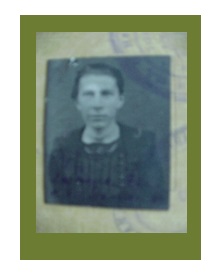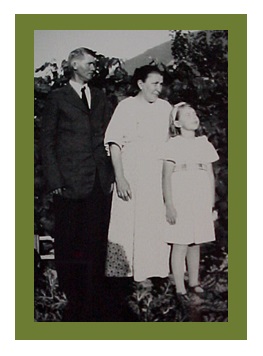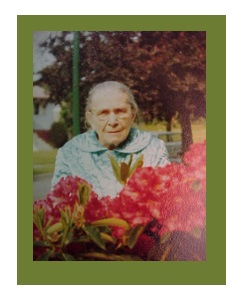|

Elizabeth Harder Harms & Heinrich (Henry) Harms
1887 - 1983 1895 -1970
Elizabeth Harder studied the serious, determined blue eyes of her slender dark-haired daughter in disbelief… “You are going to the city of Riga to study as a midwife? I hear it is an ungodly and dangerous city.” But since her youth, Elizabeth Harder Harms had been interested in caring for the sick, and God had given her a dream in which she was called to Riga to study midwifery. Why then should Riga be dangerous?”
Elizabeth, a practical 24-year-old, pursued that dream. Her father Johann Harder, a carpenter, had died at age 35, leaving her mother with seven children. Five of the children were given to various relatives. The mother together with her eldest, Elizabeth, and her youngest, a baby, were taken to another village. Because of poor health, Elizabeth was unable to seek employment for a few years, but when her health began improving, she worked as a maid for estate owners until she left to study midwifery.
Having grown up in poverty, Elizabeth was unable to finance her studies. Undaunted she approached one of her relatives, who owned a substantial estate in Molotschna colony, to request a loan. He was reluctant to lend her money for studies, but offered to finance her wedding or assist in establishing her own home. When he noticed her determination, he reflected, “On the other hand, you haven’t done anything foolish yet.” In the end he agreed to finance her studies, and in 1922, Elizabeth left to begin her studies in Riga.
There, she studied in a German Hospital, finishing her program in a year. Working long hours, she completed courses in midwifery, first aid, and diagnosis of medical conditions. All of these courses were necessary, as it turned out, she would soon be employed in a village where doctors were not available. For her practicum, she was sent to patient’s homes to deliver babies, submitting written reports to doctors in charge. Her practicum also included experience in the hospital delivery room and on the obstetrical and surgical wards. On July 11,1912, she received her certification as midwife, signed by her instructor, the inspector and director.

Elizabeth was hired as the village midwife in Schoenfeld, Ukraine in 1913.
After 1917, the Ukraine experienced chaotic conditions resulting from the Russian Revolution. First a Ukrainian peasant leader, Nestor Makhno, together with his militia of anarchists, and then the White and Red armies overran the Ukraine. From 1918 to 1920, Makhno and his followers looted and sacked Mennonite villages, often raping women and girls and murdering villagers, particularly landowners and older boys. Batjko Pravda, one of Makhno’s henchmen, established his troop headquarters in Schoenfeld. Elizabeth lived on the high school campus in the home of teacher Gerhard & Truda Schroeder. Because Makhno’s militiamen and the villagers needed the teachers and the medical personnel, their lives were spared. Elizabeth not only delivered babies but also assisted when called by the Mennonite villagers and Makhnovists who were ill, wounded or dying. One evening, Elizabeth recorded, “I thought anytime it could be my turn to lose my life. I felt deeply that I was a lost sinner, I prayed, ‘I will not leave you Lord unless you bless me.’ That evening I received assurance that I had been saved from eternal death.”
In spite of the conditions in Schoenfeld, Elizabeth stayed as a resident nurse at least until New Year’s of 1919. Then she left for Franzthal, Molotschna Colony where she continued to work as a midwife, was baptized and joined the Mennonite Brethren Church. She and her sister Anna taught Sunday School and organized a club for 13 and 14-year-old girls, a new initiative for that area.

Heinrich (Henry) Harm, who taught Sunday School and led a youth choir in Franzthal, was attracted to Elizabeth, and she feeling that the Lord had a new assignment for her, prepared for her marriage to this man. The wedding took place in Franzthal in 1924. At the same time, preparations of another kind were underway. Mennonites were arranging to leave for Canada. Elizabeth & Henry Harms did not hesitate to leave, although they knew that they would probably never see their parents and siblings again.
In 1925, they landed in Quebec and then settled briefly in Plum Coulee, Manitoba. They moved on Drake and then to Nokomis, Saskatchewan. They were anxious to have a family, but Elizabeth had several miscarriages. She jokingly used to say: “I guess it was too cold” and it was cold in their little house; water left in containers would freeze during the night. Elizabeth had 12 years’ experience as a midwife, a doctor offered her work in the hospital. She wanted to accept this position, but her husband listened to the advice of his friends, who didn’t think it proper for wives to work outside the home. Although, he disallowed her to work in the hospital, she continued to practice midwifery in the communities in which she lived.
In 1928, Henry & Elizabeth noticed an advertisement for land in mild British Columbia. Henry had heard that his cousins, Nickolai & Sara Reimer had already settled in Yarrow. Henry was an employee of the Canadian National Railway at that time and in October, he and Elizabeth boarded the train and left for Yarrow. They bought 10 acres on Central Road from Chauncey Eckert and, like other early settlers, built a house consisting of one room and a small kitchen.
Less than one year after they had arrived, Elizabeth was ill and pregnant, and her doctor ordered her to stay in bed. Elizabeth commented, “The move to B.C. did it” (produced a child).
August 18, 1929 was a special day for Henry & Elizabeth. Forty-two-year-old Elizabeth who had miscarried several times, gave birth to a daughter in Chilliwack Hospital, with Dr. Patten in attendance Henry Harms recorded that this was a difficult birth and that Dr. Patten fought to save the lives of both mother and child, while, Harms pled with God.
The daughter, Lillian states:
I was named Lilly Annie. According to my father’s memories, there were only two cars in Yarrow in 1929. Because people were too poor to pay the doctor, my mother’s expertise.. was in demand. My father, a kind man, saw the need for her services and this time did not object to his wife working outside the home. She was happy to help and, in addition to delivering babies, she was required to give other kinds of medical assistance.
My mother remembered well the pharmacist at Hipwell Drugs in Chilliwack who allowed her to read his pharmaceutical book so she could find the necessary ingredients and mix her own compounds. In doing so, she managed successfully to treat and infection under the fingernails. Girls and young women who worked as domestics in Vancouver developed this infection as a result of too much scrubbing using strong solutions. Sometimes Lily was allowed to help her mother when she treated boils by applying sterile cotton soaked in iodine to the boil, which killed the infection. Continuing her career as a midwife helped her adjust to life in Canada, whereas, Heinrich was unable to continue the teaching career he had in Russia and became a farmer in Yarrow.
Elizabeth Harms was always prepared to sacrifice her time when she someone in need.
With economic improvement in Yarrow, the place for children to be born gradually shifted from the home to the Chilliwack Hospital with a physician rather than a midwife attending.
In 1957, the Harms family moved to Vancouver where Elizabeth pursued her hobby of nurturing houseplants. By the late 1960’s she had to stay indoors and in bed most of the time because of heart disease.
In 1970, her husband Heinrich died of cancer.
Elizabeth who had always dreaded becoming a widow like her mother, lived another 13 years. Lillian recalls: “Women from church sacrificed their time to stay with her just as she had sacrificed her time to care for people in Yarrow. She never complained even though she was blind the last year of her life and she remained independent for as long as possible.
Elizabeth Harms passed away in 1983. John Dyck, a former resident of Yarrow, whose spouse was delivered by this midwife, was one of the speakers at her funeral. His biblical text, taken from Revelation 14:13 was: “that they may rest from their labors, their deeds follow them!”
Edited from Elizabeth Harder Harms, 1887 – 1983
Midwifery: A Ministry by Irma Epp, Lillian Harms and Laura Sawatsky
p 17-22 - Village of Unsettled Yearnings; Yarrow British Columbia: Mennonite Promise c2002
|
